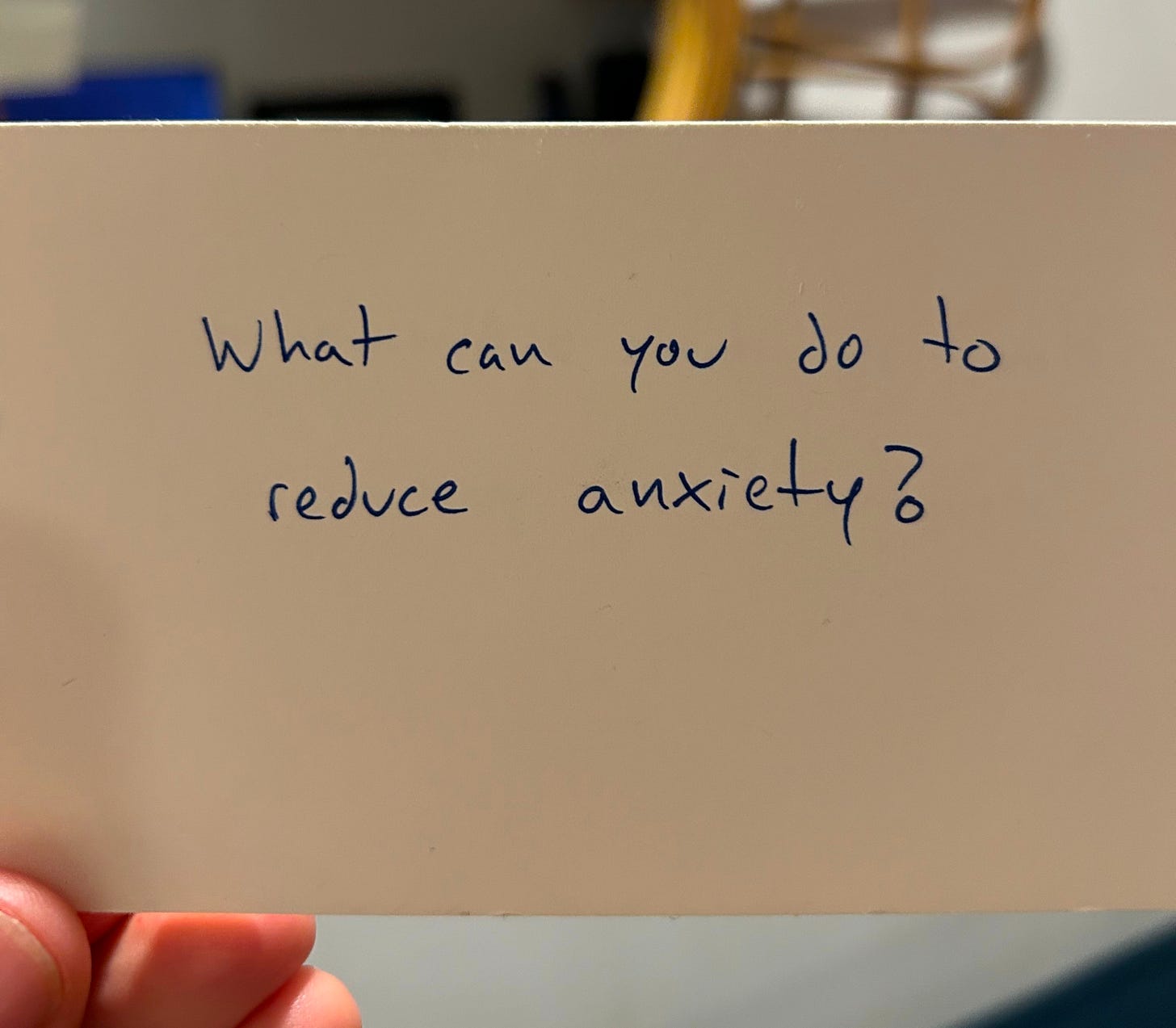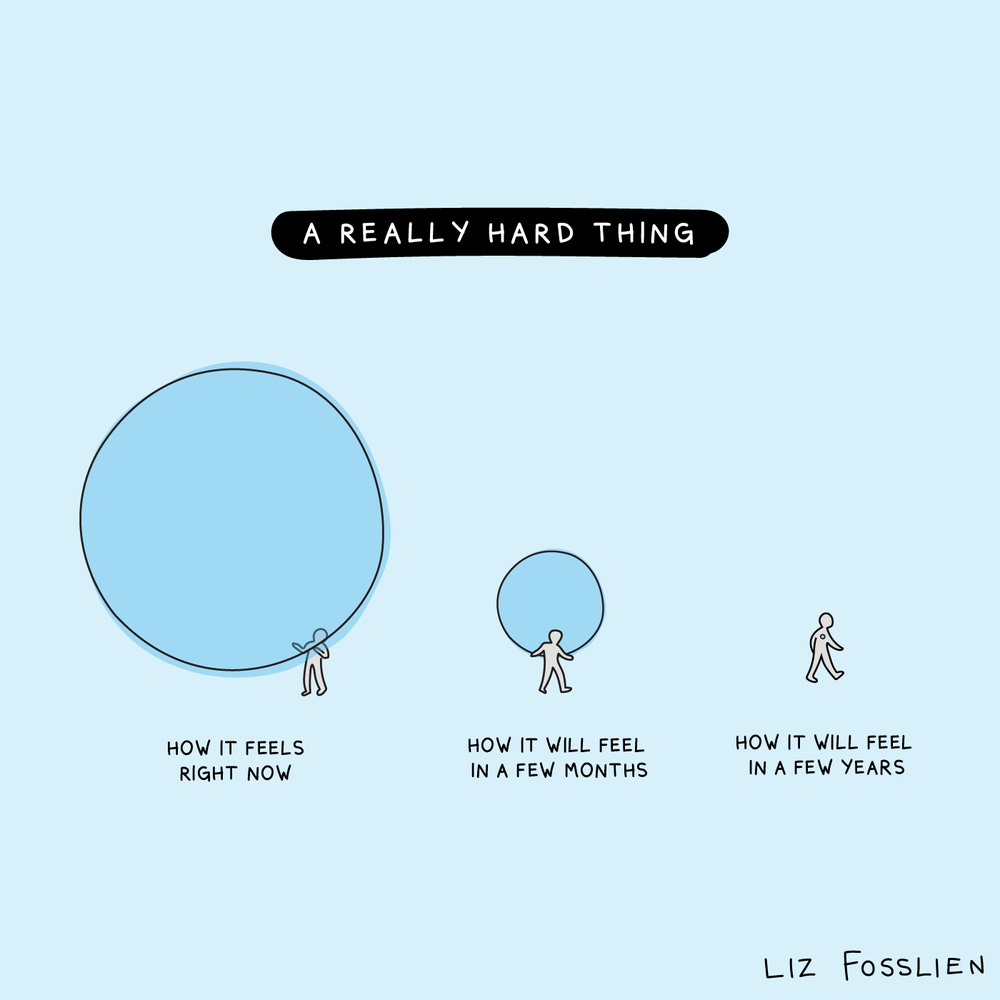You can get anxious
Three moments where I did, and ideas on how to fix it
👋 Hey, it’s Andrés. Welcome to my weekly newsletter on winning others over. My purpose is to help leaders increase their impact by improving their storytelling for influence skills. I do have a weak spot for Latinos in the US, but I do not write exclusively for them.
Today: how to calm the f*** down before or during a speaking engagement
Read time: 6 minutes
As an individual contributor or manager, a huge percentage of your success rate —promotions, having impact, getting things done— has to do with communication.
Now, this is a tricky word, because communication means a bunch of different tasks and skills, and every role has unique stakeholders.
But hey, you DO need others to see what you’re saying, to feel what you’re feeling, to do what you’re asking.
In your quest for becoming a good persuader, you will encounter moments where you need to, as the movie says, stand and deliver, and this may trigger anxiety, even fear.
Now, I’ve been helping leaders, professionals and entrepreneurs like you to become better at these things for the past thirteen years. You would guess that I can manage those things pretty easy, right?
Well, no.
I usually don’t write about stage fright, jitters, or performance anxiety —keep the concepts coming ChatGPT!—, not because I don’t like doing it or because I don’t think it’s important to discuss it.
I just don’t usually think about it… until it happens to me. Then I think about it for a couple of days, and then forget about it.
So, as you can guess, something happened recently, and I want to talk about it.
But, as a CliftonStrenghts-certified-Context-as-my-top-strength-junkie, I’ll continue this post elsewhere and then get to yesterday.
Moment 1: Frozen
Last year I took a course from a Wharton professor on public speaking. Every week, he ran an improv exercise.
In most of those experiments I did below average, but whatever. In my defense, I decided to take that class exactly because of this. As a Spanish native speaker that is starting his company on helping others develop their storytelling skills, I NEED to get better speaking and improvising in this language.
The weekly activity usually went like this: the professor shared with us a written note with a question or a topic. The instructions?
You have one minute to prepare a one-minute talk on that topic.
One day, I received this prompt:
LOL! Ok, no prob. Let me think.
As the seconds ran by, I discovered that my thinking had stopped. Like, 100% stopped. I panicked, and thought:
Eh, no problem, it's just anxiety. I need to calm down, and I'll go back to normal mode.
Eventually, I ran out of time and had to stand up. I said something like:
What can you do to reduce anxiety? Well... I mean, for some reason, I am really anxious right now...
After some more seconds of no words, I felt my head getting hot, and decided to sit down.
I took a couple of breaths while still burning from shame.
I stood up again, and with a smile and a lot of breathing and pauses, I started, and actually manage to finish my presentation.
Tip 1: Pause and take a couple long breaths when you’re feeling jittery or downright absolutely f terrified
Moment 2: Wink
This past January I applied to speak at the Penn Grad Talks event. I got accepted so I got to work.
I spent DOZENS OF HOURS preparing, and at least twenty full rehearsals (you can see evidence for the last nine).
Eventually, the day of the event arrived. Just four or five minutes before my turn, I blanked. I couldn’t remember any of what I had rehearsed.
Then, I stumbled across Top, one of my best friends that was arriving at the scene to watch my talk.
He winked and said:
Hey, you’ve got this.
And I did!
You can watch my talk here, which, by the way, was delivered at the verge of running out of breath.
Tip 2: Find Top before your presentation and ask him to tell you that everything’s going to be fine. Ok, jk. The tip is: look for reassurance from someone you love and / or trust. This will get you out of your head.
Moment 3: Sleeping
As part of a global contract we signed with a Coca-Cola bottler that has presence in five countries, we’re helping them develop storytelling skills and influential leadership in one thousand managers.
Yesterday, I had to facilitate an INSPIRA for a group of managers around the US.
Now, I’ve been facilitating INSPIRAs for the past twelve years. You could say that I’m experimented and almost always fired up and ready to go.
But somehow, I couldn’t focus while preparing for this specific workshop. I spent a couple of hours trying to rehearse, but got frustrated because I was losing grip of my attention. I tried a dozen times to focus without getting even close to a flow state.
Suddenly, my kids came home from school, and I decided to spend time with them, a non-negotiable for me.
I later went back to the slides and kind of felt better, so I went to sleep after a couple of extra hours of practice.
Then, in the middle of the night, I starting waking up.
Something felt wrong.
After the fourth or fifth time, I decided something. I had to force myself to repeat a phrase that could soothe my stupid brain. I tried this one:
mañana va a ser un gran día, mañana va a ser un gran día, mañana va a ser un gran día, mañana va a ser un gran día
And it worked. I eventually managed to sleep, kind of.
I woke up, jumped in the Zoom meeting, and delivered.
Now, how do you think the workshop went?
NEARLY PERFECT. I —and this is me self-evaluating— was charming, funny, clear, engaging.
But I share this story because of how irrational our fears, anxiety and unease usually are.
Yo have to push through, and trick yourself into moving to a different mental state. Also, you need to sleep.
Tip 3: It is paramount for you to sleep well before a presentation. If you need to, take a sleeping pill, but do get your required sleep time.
Into the future
By now, I’m convinced that these jitters will always be there, hiding, lurking (omg, I managed to use the word “lurking” in a newsletter about storytelling and influence).
Sometimes they’ll come out, some other times they’ll stay in the shadows. But they’ll never go away.
Look for the tools that will help you go through these moments. At the end of the day, the following illustration is almost always true, specially related to moments of communication:
What do you think? Did I manage to connect with you? Did any of the stories resonate with you?
That’s all for today!
Ps. I’m giving a talk in Spanish for the EXATEC Community in the NY, NJ & CT region on to use storytelling to accelerate your career. Here’s the invite and the link to register:
See you next Wednesday. Here’s a link to my Calendly.
If helping leaders, salespeople and senior IC develop storytelling for influence skills is part of your work, let’s talk!






